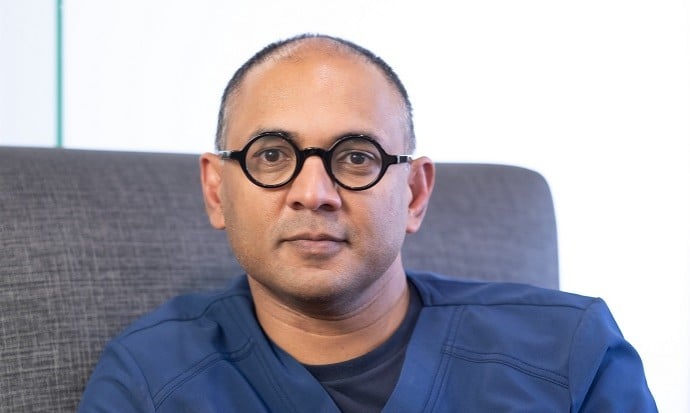
Professor Llewellyn Padayachy completed his undergraduate studies at the University of Pretoria (UP) and a postgraduate degree at the University of Cape Town. He was a postdoctoral fellow at the University of Oxford in the UK, and undertook visiting fellowships and a professorship at the Carlo Besta Neurological Institute, University of Milan; Baylor Medical College; and Eberhard Karls University of Tübingen.
He also paid short academic visits to the Neurosciences Institute, Stanford University; Boston Children’s Hospital, Harvard University; and Great Ormond Street Hospital for Children, University College of London.
In 2019, Prof Padayachy joined UP, where he says he found world-class infrastructure and support, adding that the research priorities of the Department of Neurosurgery are well aligned with the goals in the Faculty of Health Sciences. He leads the Brain Tumour and Translational Neuroscience Centre (BTC@UP). The centre’s research has a strong focus on early point-of-care diagnosis, and the improved surgical care of adults and children with brain tumours.
He states his field of research would contribute to the betterment of the world because early diagnosis is the best predictor of improved survival among brain tumour patients.
“That is why we have a strong research focus on developing and testing point-of-care diagnostic modalities,” Prof Padayachy says. “We have also refined our surgical technique and intra-operative use of adjuncts to provide the best neurosurgical care available.“
The Brain Tumour and Translational Neuroscience Centre has strong transdisciplinary and cross-faculty research collaborations with UP’s Departments of Physiology, Anatomy, Engineering, Paediatrics, Neurorehabilitation, Radiology, Nuclear Medicine, and Neurology.
A recent highlight of the centre’s research was the use of a novel mobile optical coherence tomography (OCT) scanner that collects and analyses images at bedsides. Prof Padayachy says they also have developed the Safe Neurosurgery Initiative to optimise intra-operative surgical capability, taking a structural, functional monitoring approach to maximise safe resection for children and adults with brain tumours.
“We have improved our capacity in the neuro-critical care and neuro-rehabilitation phases of treatment, and have exciting international collaborative research projects in these areas,” he says
As for what inspires Prof Padayachy in his research, he says he’s drawn inspiration from various events and sources over the years.
“The little patients we treat have always provided a sobering reality; it is no less than an absolute privilege to be entrusted with the care of these children,” he says. “The Japanese principle of kintsukuroi [a Japanese art form that uses seams of gold leaf to mend broken pieces of pottery, making them more valuable] is perhaps no more relevant than when we care for sick children – we would like them to feel better because of the care we have given them, in spite of being ‘broken’.
“When it comes to people, every good and decent thing I’ve learnt has been from the incredible foundation that was inspired by my grandparents at a very young age, and by my mother ever since. I’ve always been guided by a profound sense of spirituality and integrity.”
Prof Padayachy’s academic role model is the late Prof James Goodrich, who’s based in the Bronx in New York.
“Apart from being among the world’s best paediatric neurosurgeons, he was an exceptionally warm, compassionate human being, with a quirky passion for rare books, pens and art, an obsession that I happen to share. He guided not just my surgical skill, but also my thought pathway and career in neurosurgery.”
Prof Padayachy hopes to make a small but meaningful difference in the lives of children with brain tumours. He says his research matters because it may have wider relevance: while it started out with the aim of diagnosing raised intracranial pressure among children with brain tumours early, it may also be used for diagnosing raised intracranial pressure in astronauts in microgravity environments.
He offers the following advice to school learners or undergraduates who are interested in his field: “The fact that you must do it and do it to the best of your ability is incredibly important – slightly paraphrased from the great Mahatma Gandhi.”
He loves spending his free time with his daughters, whom he calls his “source of inspiration and joy in everything”.
 Story
Story
Paediatric neurosurgeon Professor Llewellyn Padayachy, Head of the Department of Neurosurgery at the University of Pretoria’s (UP) Steve Biko Academic Hospital, is redefining how brain-related diseases are diagnosed and treated, especially in low-resource settings. He’s at the forefront of pioneering work in non-invasive techniques to assess and measure raised pressure inside the skull,...
 Infographic
Infographic
Africa faces immense challenges in neurosurgery, such as severe underfunding, a lack of training positions and a high burden of disease. There is one neurosurgeon per four million people, far below the WHO’s recommendation of one per 200 000. This shortage, compounded by the lack of a central brain tumour registry and limited access to diagnostics, severely impacts patient outcomes.
Copyright © University of Pretoria 2025. All rights reserved.
Get Social With Us
Download the UP Mobile App